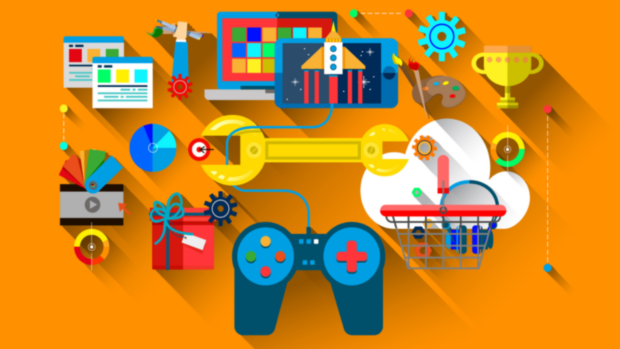According to a recent study by Bain & Company, generative artificial intelligence (AI) is set to dominate 50% of video game development globally, taking over tasks such as story generation and nonplayable character design within the next five to 10 years. However, companies must be ready to face the challenges of adopting AI. The video game industry, as stated by SuperData Research, is larger than the music and movie industries combined, with projected revenue of $334 billion this year and approximately 3.09 billion players worldwide, as reported by Exploding Topics. The transformation of this entertainment medium will have a significant impact on millions, so it’s crucial to understand how AI will reshape it. This article will focus on the potential benefits of AI game development, as well as its potential impact on game developers and production companies.
How will AI game development affect the industry?
(Photo credit: byowls.com)
Bain & Company conducted interviews with gaming industry leaders to explore the benefits and challenges of adopting AI. Most of them have high expectations for the technology, believing it will have a greater impact on their business than virtual reality, cloud gaming, and other technologies. However, only 20% of executives believe generative AI will reduce costs, which may disappoint some as the development of most AAA games can cost up to a billion dollars. Surprisingly, 60% of executives don’t expect AI to significantly impact the workforce. While generative AI is primarily used in preproduction, game executives claim, for instance, that Blizzard Entertainment has employed a machine-learning model called Blizzard Diffusion to quickly generate concept art for its titles like World of Warcraft.
Now, let’s delve into how AI game development could affect other aspects beyond preproduction:
– Story Generation and Nonplayable Characters (NPCs): Generative AI has the potential to allow for limitless interactive stories instead of relying on canned dialogue for NPCs. Nvidia, for example, demonstrated how its AI model enabled a chef character to engage players in spontaneous conversation.
– Game Assets: Rather than having several artists create game worlds, generative AI can generate entire worlds. An example of this is Starfield, the latest Bethesda title which used AI procedural generation for its planets, as reported by TrustedReviews.
– Live Ops: Bain suggests that generative AI could enhance community management and player support.
– User-Generated Content: Players could contribute to creating more content for games, further enhancing their enjoyment. Roblox, for instance, plans to release a generative AI asset creator soon.
Chinese development company HoYoverse, responsible for Honkai: Star Rail, has also embraced generative AI to improve facial appearance and character behavior, demonstrating the widespread adoption of this technology in the industry.
What are the challenges of AI game development?
(Photo credit: linkedin.com)
While generative AI offers immense potential for game development, executives acknowledge that there are challenges to its adoption. Bain & Company has identified several in their study:
– Generative AI Strategy: Many gaming firms lack clear, long-term plans for maximizing the potential of generative AI. However, this is common with any new technology. Failure to plan can affect prioritization, resource allocation, and integration with existing processes.
– Navigating the Shifting AI Landscape: With numerous companies entering the generative AI space, it becomes challenging to identify which ones offer the best services.
– Technology Implementation: Game company leaders anticipate technical challenges in implementing generative AI into game engines.
– Talent Implications: While some believe that generative AI could eliminate jobs in the video game industry, Bain reports that only 10% of companies are highly concerned about this. Most see it as another tool that designers and developers must learn.
Anders Christofferson, a leading gaming partner at Bain’s Media & Entertainment practice, shares more insights about AI game development, stating that it will fundamentally change the way games are made, particularly in the preproduction and production phases. This change will free up time spent on less valuable activities, allowing developers to focus more on the creative storytelling aspect of game making.
In conclusion, AI game development has the potential to significantly transform how game developers and designers create future titles. Contrary to popular belief, it is unlikely to eliminate jobs in the industry. Instead, this technology will enable companies to produce games faster and more efficiently, freeing up time for more creative storytelling. To learn more about Bain & Company’s findings, you can read the original article published by them. For more digital tips and trends, check out Inquirer Tech.
Denial of responsibility! Vigour Times is an automatic aggregator of Global media. In each content, the hyperlink to the primary source is specified. All trademarks belong to their rightful owners, and all materials to their authors. For any complaint, please reach us at – [email protected]. We will take necessary action within 24 hours.


